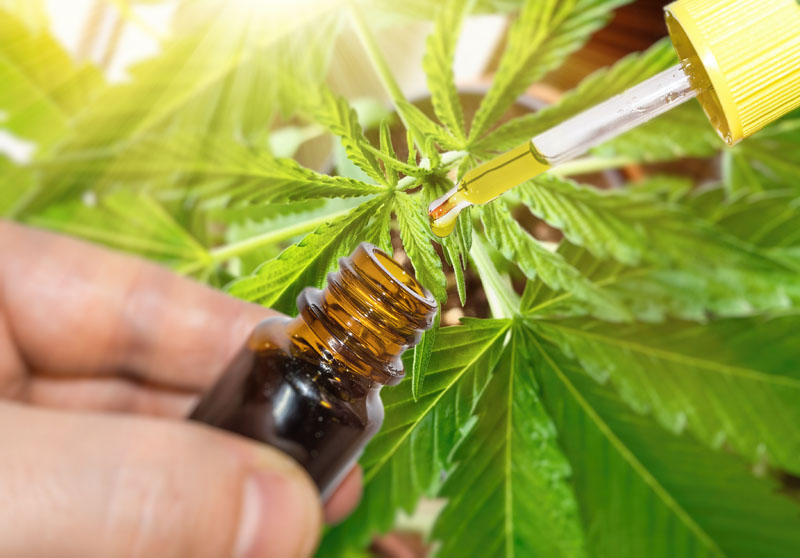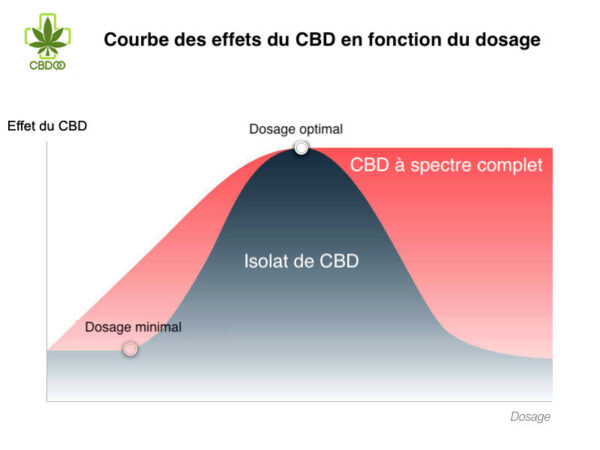Have a question? 06 70 73 89 02
🔞 Not for sale to under 18s
30% off EVERYTHING on the site with the code: ULTIME!!! 🔥 ( except accessories and gummies)
Have a question? 06 70 73 89 02

There are a multitude of products containing CBD: oils, capsules, flowers, resins... Nevertheless, taking CBD in oil form is one of the most effective ways of consuming cannabidiol.
In a bottle, it's very convenient to take and easy to measure out thanks to its dosing pipette. What's more, by placing the drops under the tongue, the CBD rapidly comes into contact with the endocannabinoid receptors, ensuring rapid, optimal efficacy.
There are three types of CBD oils:
Full-spectrum CBD oils contain all the cannabinoids available in hemp. As these substances reinforce each other, their effectiveness is greatly enhanced when combined. This is known as the entourage effect.

CBD can be the source of many positive effects improving everyday well-being. It can help with :
As you can see from the curve above, the choice of CBD oil has a major impact on the effects of CBD and its duration of action.
As you can see from the blue curve, an isolate containing only CBD has a limited effect over time, producing a bell-shaped curve. After reaching its maximum effect, CBD activity fades until it disappears.
On the contrary, the effects of full-spectrum CBD on the red curve are maintained over time. Even if the optimal dosage is exceeded, the effects remain at their high level. [1]
That said, it doesn't mean you should take CBD without moderation. We always advise you to start with the lowest possible dose of CBD before increasing it if necessary. In fact, it's very important to know how your body reacts before gradually increasing the dose.
Like all active substances, its effect on your body is conditioned by many factors. To findthe perfect amount of CBD oil for you, you need to consider:
We mention medications and alcohol you might have taken at the same time to cover all aspects of CBD dosing. However, we would remind you that it is strongly inadvisable to consume CBD if you have or will ingest alcohol. Likewise, if you are undergoing treatment, please consult your doctor before taking CBD.
Generally speaking, the dose to be taken ranges from 1 mg to 6 mg per 5 kg. For example, an 80 kg person would need to take between 16 and 96 mg, depending on the intensity of the pain.
If this is the first time you've tried CBD oil as a painkiller, it's best to start small (between 16 and 30 mg for an 80 kg person) and then increase as needed.
In all cases, the maximum not to be exceeded is 1500 mg/day.
Step 1 Determine the minimum dose based on the various factors to be taken into account
Step 2 Calculate the correct dosage using the information below. The type of oil is not taken into account in the basic dosage, only the concentration:
Step 4 Patience
Finding the right dosage takes time to produce the desired effects. While some effects can be felt immediately (e.g. pain, depression), others require "accumulation" (e.g. epilepsy relief).
To go further, if you want to know the doses that are prescribed for serious pathologies, here are the recommended dosage ranges according to the Mayo Clinic College of Medicine and Science:
--
Now that you know everything there is to know about CBD oils and their dosages, all that's left is to give it a try!
We remind you in passing thatcannabidiol can have undesirable side effects, but even if none of them have serious repercussions, even at high doses, that's no reason not to take precautions!
If you've found this article useful, don't hesitate to check out our blog for lots of useful information on CBD and the latest news!